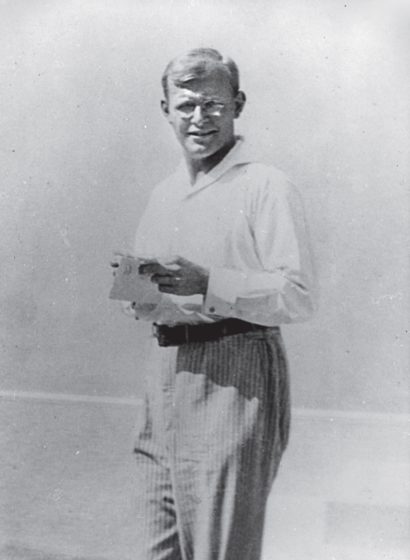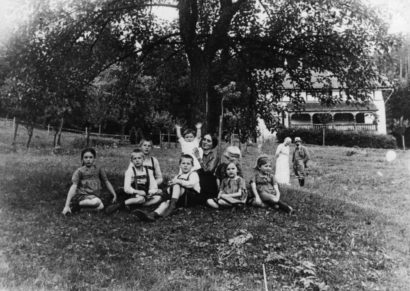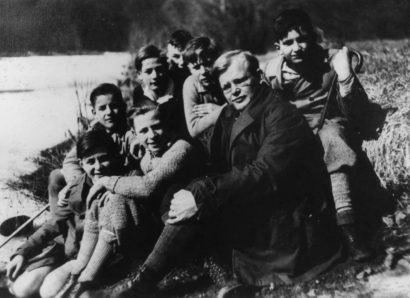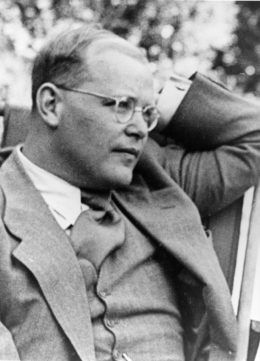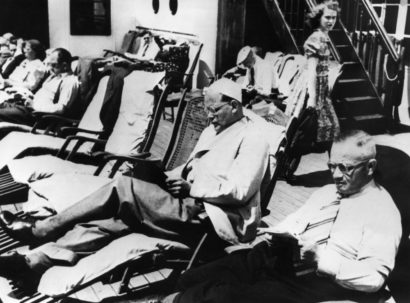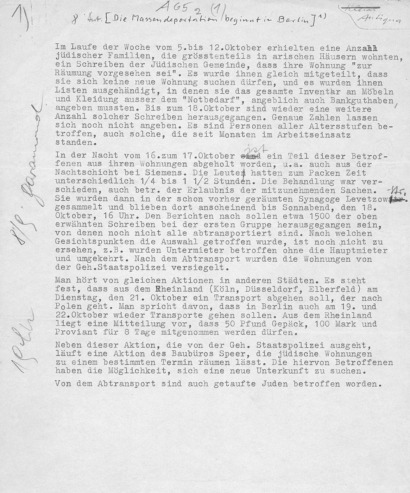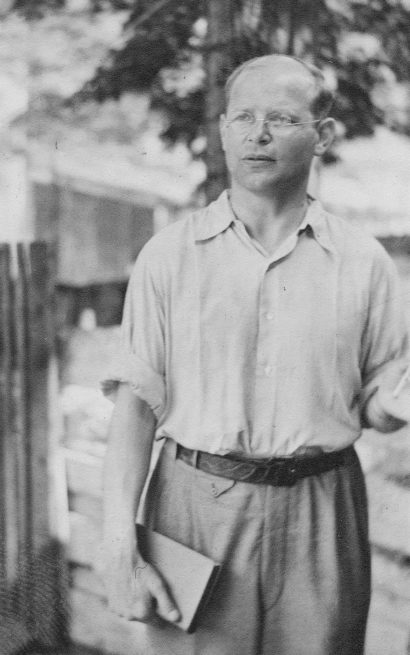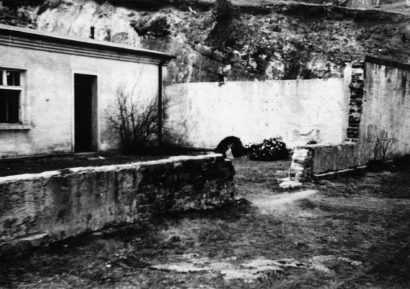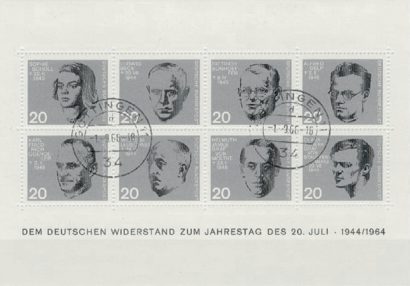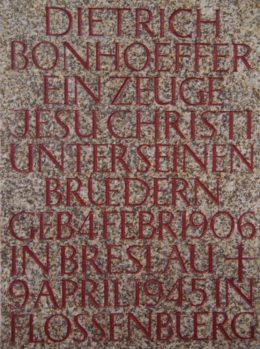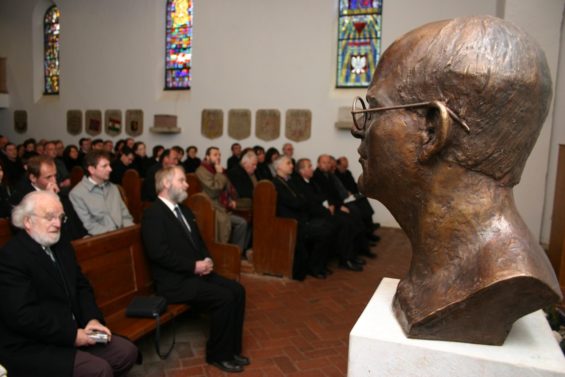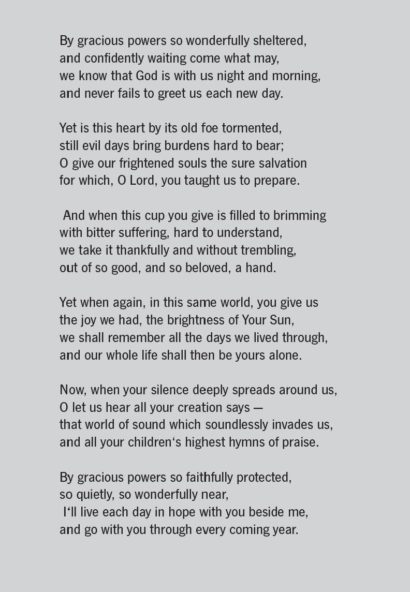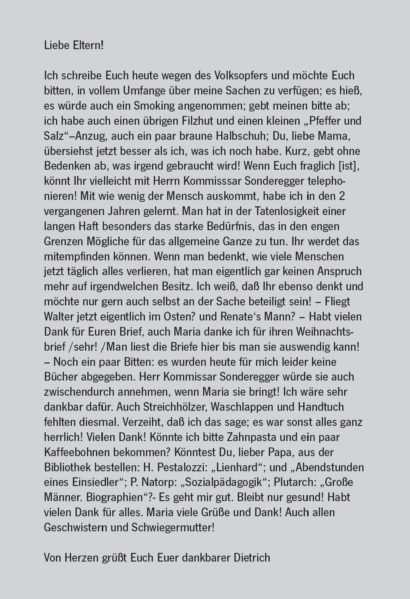Dietrich Bonhoeffer
February 4, 1906 – April 9, 1945
![]()
Dietrich Bonhoeffer in Gland near Lake Geneva, Switzerland, 1932 (Berlin State Library)
“A Spoke in the Wheel”
Dietrich Bonhoeffer was born in Breslau, the sixth of eight children of the prominent psychiatrist Karl Bonhoeffer and his wife Paula. After completing high school, Dietrich Bonhoeffer began to study Protestant theology and received his doctorate in 1927. He completed his graduate training for the ministry in Barcelona. Next he obtained his qualifi cations to become a professor and completed an academic year in New York. Until 1933, Dietrich Bonhoeffer worked as a lecturer and university pastor in Berlin. He worked with disadvantaged youth in the working-class district of Wedding. A convinced opponent of the National Socialist regime, Dietrich Bonhoeffer spoke in a radio address on February 1, 1933, shortly after the seizure of power, asserting that “leaders and governments that worship themselves make a mockery of God.” The radio transmission was interrupted because of its unmistakable criticism of the National Socialist principle of leadership. That same year, Dietrich Bonhoeffer accepted a foreign appointment as a pastor in London. He returned to Germany in 1935, and took over the training of young pastors for the Confessing Church. He became one of the leading theologians of this religious opposition movement.
Please find more information on Dietrich Bonhoeffer on our website "Bonhoeffer Initiative":
![]()
The Bonhoeffer family in front of their vacation home in Wölfelsgrund, Silesia, July 1911 (Berlin State Library)
Dietrich Bonhoeffer grew up in an upper-class family with seven brothers and sisters.![]()
Dietrich Bonhoeffer with confirmation candidates from the working-class district of Wedding on a trip to the Harz, 1932 (Berlin State Library)
![]()
Dietrich Bonhoeffer in London, 1939 (German Resistance Memorial Center, Berlin)
![]()
Dietrich Bonhoeffer on the deck of a ship to New York, 1939 (Berlin State Library)
Bonhoeffer was invited to give guest lectures in the United States in 1939. However, his trip was overshadowed by the looming international crisis. Bonhoeffer decided to cut his trip short and return to Germany: “I realize that I’ve made a mistake by coming to the United States. I must stand by the Christians of Germany during this difficult time in our national history. I will have no right to participate in the reestablishment of Christian life in Germany after the war if I do not share this time of trial with my people.”
After the regime shut down Dietrich Bonhoeffer’s seminar, the pastor continued to work underground until 1940. He maintained contact with the military resistance through his brother-in-law, Hans von Dohnanyi. Bonhoeffer accepted an appointment to the Wehrmacht intelligence service, officially in order to defend against espionage with help from his contacts abroad. But unofficially Dietrich Bonhoeffer exploited his position to obtain political support from the Allies for the resistance against Hitler. On April 5, 1943, Dietrich Bonhoeffer was arrested by the Gestapo. He was jailed in Berlin for two years without trial. During this period, he wrote his most important theological works.
![]()
Bonhoeffer’s report on the first mass deportation of Jews, October 18, 1941 (Berlin State Library)The systematic deportation of the Jewish population began in Berlin on October 16, 1941. Several days later, Bonhoeffer wrote two reports for the military resistance in order to encourage them to expedite their plans to overthrow Hitler. Excerpts from this report were forwarded to General Ludwig Beck. These documents are the first accounts of deportations of the Jews in Germany.
![]()
Dietrich Bonhoeffer in the Tegel jail courtyard, July 1944 (Berlin State Library)
In early February 1945, Dietrich Bonhoeffer was transferred to the Buchenwald concentration camp. On April 5, 1945, Adolf Hitler ordered the execution of the remaining “conspirators” of July 20, 1944. In early April, Dietrich Bonhoeffer was transferred from Buchenwald to Flossenbürg, which at that point was still located a great distance from the approaching front. In addition to Bonhoeffer, six more men from the military resistance were incarcerated in the detention building in the Flossenbürg concentration camp. A summary court trial, headed by Otto Thorbeck and Walter Huppenkothen of the Reich Security Main Office and the camp Kommandant Max Koegel, convicted the seven men of high treason and sentenced them to death. Dietrich Bonhoeffer was hanged by the SS on the morning of April 9 in the courtyard of the detention building. His family did not find out about his death until four months later.
![]()
Vestiges of the execution site in the courtyard of the detention building of Flossenbürg concentration camp, ca. 1964 (Berlin State Library)
![]()
Postage stamps by the German Postal Service to commemorate the twentieth anniversary of July 20, issued in 1964 (Flossenbürg Concentration Camp Memorial)
The death sentence against Dietrich Bonhoeffer and the other resistance fighters remained legally valid until the 1990s, and Bonhoeffer was not officially recognized as a victim of National Socialist persecution. In 1996, the National Socialist verdicts were finally overturned, thus formally rehabilitating Dietrich Bonhoeffer. However, since the 1960s, Dietrich Bonhoeffer has been an important symbol of Christian resistance to National Socialism, both within the Protestant Church and beyond. Many church congregations, schools and streets are named after him.
![]()
Memorial plaque of the Evangelical Church in the center of the town of Flossenbürg (Flossenbürg Concentration Camp Memorial)
The plaque was erected in 1953 with support from the Bavarian Pastor’s Brotherhood. In the early years following the war, Bonhoeffer was not always acknowledged as a resistance fighter, even within the Protestant church.![]()
Bust of Dietrich Bonhoeffer in the concentration camp memorial chapel, erected on occasion of the sixtieth anniversary of his death, 2005 (Flossenbürg Concentration Camp Memorial)
![]()
The last letter by Dietrich Bonhoeffer to his fiancée Maria von Wedemeyer is dated December 19, 1944 (Flossenbürg Concentration Camp Memorial)
In this letter, Bonhoeffer included the poem “By gracious powers.” The text was used for a well-known church hymn that has over 35 recordings today.
Fred Pratt Green (1903-2000), based on the German of Dietrich Bonhoeffer. English versification Copyright Stainer & Bell Ltd, London, England. Adapted by permission of SCM Press from Bonhoeffer‘s “Powers of Good”, Letters and Papers from Prison (1971).![]()
Bonhoeffer’s final letter received from the camp, written to his parents on January 17, 1945 (Flossenbürg Concentration Camp Memorial)
